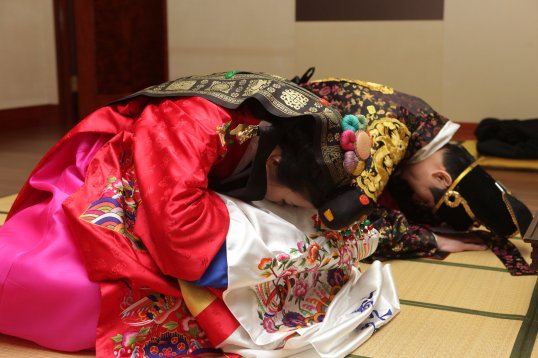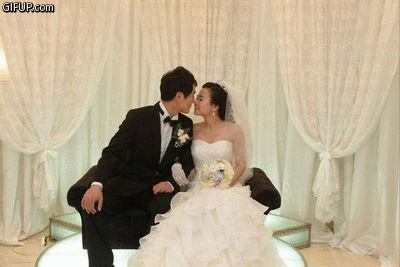Every foreigner who is married to a Korean knows that multicultural marriage is not that easy, especially marriage between a Korean national and a Filipino. Before getting the spouse visa from the Korean Embassy, there are TONS of documents you and your spouse will have to prepare, but even if you have brought all the pertinent documents and they have been authenticated, you and your better half will need to attend an interview with a group of Filipinos marrying Koreans, from which an official of the Korean Embassy blabbers non-stop in Korean Language, telling not-so-good things about (some) Filipinos marrying Koreans, warning them about the possibility of being used for their money or for the chance of getting to Korea for a job or a better life.
Later, the official starts asking personal questions to each couple in the room, such as: “Why did you marry him/her?”; “How long have you known each other?”; “How did you meet?”; “Were you introduced by a relative/friend? through a matchmaking agency?”; (To the Filipino) “Why are you going to Korea?”; “Do you know this man/woman you married?”; “Have you met his/her family?”; “Do you know what his/her job is?”. The questions seem endless, some degrading, and you have to answer them in front of other couples who will be asked the same things.
When my husband and I had our interview in the Korean Embassy in Manila, we were quite confident that we would not be given a hard time, because we submitted all the requirements. Besides, we have known each other for 7 years before we got married and both his and my friends and family can attest to our long-distance relationship… but you see, even if you’ve got nothing to hide, you will get the same suspicious glare from the official interviewing you, so it’s normal to get nervous.
My husband was holding my hand as we were waiting for our turn to be interviewed. I remember him whispering to me: “Don’t worry. Just answer the questions.” My visa was approved without having to undergo another scrutiny, but not all visa applicants in the room were as successful. A very young Filipina was not granted the visa, because her husband is 30 years older than she is. Another Filipina who said she met her husband three days ago and she couldn’t tell his name or job got her visa denied, too. Some couples were asked to stay for (maybe) a second interview, most of whose marriages were arranged by brokers of matchmaking agencies in Korea, which, by the way, is LEGAL in South Korea, but ILLEGAL in the Philippines, according to the Anti-Mail-Order Bride Law (Republic Act 6955 Section 2):
It is hereby declared unlawful:
(a) For a person, natural or juridical, association, club or any other entity to commit, directly or indirectly, any of the following acts:
(1) To establish or carry on a business which has for its purpose the matching of Filipino women for marriage to foreign nationals either on a mail-order basis or through personal introduction;
(2) To advertise, publish, print or distribute or cause the advertisement, publication, printing or distribution of any brochure, flier, or any propaganda material calculated to promote the prohibited acts in the preceding subparagraph;
(3) To solicit, enlist or in any manner attract or induce any Filipino woman to become a member in any club or association whose objective is to match women for marriage to foreign nationals either on a mail-order basis or through personal introduction for a fee.
It makes me wonder why Filipinos are mostly the culprits when marriage between a Filipino and a Korean doesn’t end well, when in fact, our country does not approve matchmaking, and it’s Korea that legalizes matchmaking firms as long as the agency is registered and “aware of issues concerning inter-racial marriages and ethics”. There are more than 1, 000 matchmaking companies in South Korea. How does the Korean government gauge these matchmaking agencies’ “awareness of such issues”?
In the Korean Embassy, based on what I’ve heard and witnessed during the interview, Filipinos marrying Koreans are perceived as “users”. Every one of us a suspect; our Korean spouse a possible victim.
A Filipina my husband and I know shared us her unpleasant experiences in the Korean Embassy when she was applying for her visa. Because her husband was not with her, she had a really hard time and was asked to come back many times. Stressed and tired, she called her husband in Korea, and had him talk to one of the officials. They settled things right then and there, on the phone. He had to return to the Philippines for the interview. A Korean marrying a Filipino is required to attend the interview with his/her spouse.
Thank God, on the day of our interview, I was able to meet some Filipinos who might have lessened the prejudice a bit. There were couples like us, who have known each other for years and have fallen in love before finally deciding to tie the knot. One couple went to the same church and had been in a ten-year relationship before they got married. A couple went to the interview with their two children. They had lived in the Philippines for years since their wedding. The woman and her children had never been to Korea. I don’t know the rest of the story, but the woman was there, obviously, for the spouse visa. I sure remember them, because one of their kids kept crying during the interview and the Korean Embassy official curtly asked the woman to take her child out of the room. A man, who had been working in Korea for years, met his wife there, but they both had to go to the Philippines, so that the woman could meet his family. The man is fluent in Korean Language. He and the official spoke in Korean all throughout his interview.
Of all the questions I was asked that day, there are four I recall:
OFFICIAL: How long have you known your husband?
MY ANSWER: Seven years.
OFFICIAL: How did you meet him?
MY ANSWER: I was his English teacher.
OFFICIAL: Why did you marry him?
MY ANSWER: I love him. (I remember my husband looking at me and I’m pretty sure that my face was flushed as red as a tomato.^^)
OFFICIAL: Why are you going to Korea?
MY ANSWER: I want to be with my husband.
During the interview that follows CFO’s guidance and counseling session, I was asked this question again: “Why did you marry a Korean?”
A few days ago, someone asked me the same thing. It was meant as a joke from a drunk friend. I’m tired of being asked this question. Is it such a BIG deal to marry somebody of another race? I answered him anyway, and it’s the last time I am ever going to answer a silly question: “Why I married a Korean? I didn’t marry a Korean. I married the man I love.”
Related articles
-
Just How Important Is Your Alien Registration Card (ARC)? (chrissantosra.wordpress.com)
- F-5: Permanent Residence Visa in South Korea (chrissantosra.wordpress.com)
- My Korean Husband Drinks… Should I Be Bothered? (chrissantosra.wordpress.com)
- Husband (chrissantosra.wordpress.com)
- Welcome to Korea!!! ^^ (chrissantosra.wordpress.com)
- Getting Married in Korea (chersurvivingkorea.blogspot.kr)
- Marrying a Korean (buhaykorea.com)
- Import of Korean noodles banned in PH (globalnation.inquirer.net)
- Korean embassy wants ban on Korean noodles lifted (rappler.com)
- Flashback Friday: Korea (mashedpotatoesblog.wordpress.com)
- 7 ways to learn Korean for free (matadornetwork.com)
- Elephant Speaks Korean, Video (ramanan50.wordpress.com)
Filed under: Expats in Korea, Filipinos in Korea, Love, love, love..., Perspectives Tagged: CFO Seminar, Filipino, Filipino people, Korea, Korean, Korean Embassy, Matchmaking, Multicultural Marriage, Philippine, South Korea





Comments
Re: Why I Married a Korean
I'm sorry to hear that you and others have had to go through this ordeal. I'm an American man who married a Korean woman, and to the best of my knowledge I don't recall anyone asking these questions of us from the various government agencies we had to deal with.
Re: Why I Married a Korean
Sadly, most Koreans do not think this way. It seems to be the people running the place with no empathy. They have no regard for your feelings or the everlasting stain it leaves on someone. We are branded here, we are brand Waykook and they Korea.
Somehow, if this negligence continues, there will be no brand Korea as it now. I have written to newspapers, ministers , no reply, etc. No response about the racism. Like a one-eyed Dinousaur, they indulge a Doyouthinkhesaurus philisophy. If you haven't been formally introduced, you do not exist.
Look at how many new posts on here about issues of discrimination; complaining about things that should be illegal.
Re: Why I Married a Korean
While it may well be sold to you and your husband as a Filipino problem (that the Filipina only wants to marry to get out of the Philippines), the hard truth and one Korean authorities are very aware of, is that many, many Korean men simply ordered a Filipina over the net and brought them to Korea pretty much just for sex.
Then kicked them out on the street. Koreans (as all foreigners) can divorce Filipinos in their home country - something many Filipinos do not believe as divorce is nigh on impossible in the Philippines.
So the Korean authorities were making it incredibly easy for Korean men to abuse Filipinas, and they did - big time. Filipino children (Korean fathers) are well over represented in Korean orphanages. Newspapers and the media are at last mentioning this and that Koreans should accept their responsibility in this, not just make it sound like it was all the fault of gold digging Filipinas. If the Korean male just walks away, what can the Filipina do? Nothing. Many stay and try to make ends meet through illegal work, earning pennies. It is incredibly shameful and the authorities here should be embarrassed at how they did/do so little.
But remember - Koreans (again, as most Asians) cannot stand losing face or feeling shame, so it makes sense they choose to give you a hard time rather than the Korean male, as in the end the result is the same....any feeling this is all arranged (from either side) and the visa is cancelled.
Of course, let me add not all Korean men have bad intentions. But it is a known and official problem, the amount of failed marriages and abandoned children of Filipina/Korean marriages. And everyone knows it is ridiculous to suggest all the Filipinas were to blame for that, as they are a family believing and marriage is sacred people.
Re: Why I Married a Korean
But remember - Koreans (again, as most Asians) cannot stand losing face or feeling shame, so it makes sense they choose to give you a hard time rather than the Korean male, as in the end the result is the same....any feeling this is all arranged (from either side) and the visa is cancelled.
Never a truer word said!
Re: Why I Married a Korean
Re: Why I Married a Korean
Re: Why I Married a Korean